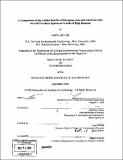A comparison of the airline benefits of European-style and American-style aircraft purchase options in periods of high demand
Author(s)
Miller, Owen (Owen Charles)
DownloadFull printable version (4.603Mb)
Other Contributors
Massachusetts Institute of Technology. Dept. of Civil and Environmental Engineering.
Advisor
John-Paul Clarke.
Terms of use
Metadata
Show full item recordAbstract
Commercial Aircraft are commonly acquired by an airline in a contract that specifies a fixed quantity of firm orders as well as options that allow the airline to obtain additional aircraft at a future time for an agreed price. This option purchasing process allows the customer to avoid taking delivery of aircraft if economic circumstances are not favorable. However, this model can have drawbacks in circumstances when the product in question is in very high demand. Exercising a rolling-style aircraft purchase option in such circumstances may result in a delivery lag of several years, during which profitable opportunities may be lost. Shortening the time between exercising an option and taking delivery of the aircraft would allow for better timing of the delivery and reduce the effect of a significant negative event such as an economic recession or a terrorist attack occurring between the exercise date and the delivery date. (cont.) In this thesis, an alternative purchasing system using fixed-term aircraft purchase options is presented. In this system, customers are able to make the decision to exercise an option at a later point in time, with more information, yet receive the aircraft at the same time as the current system. Additionally, in situations where the decision to accept an aircraft has been made, it will allow the customer to acquire the aircraft sooner. The proposed alternative system is presented and the potential benefits and difficulties are discussed including potential incentives for manufacturers to offer such a system. A simulation is presented to compare the relative value of a fixed-term option to a rolling option under hypothetical circumstances. The simulation shows that under the circumstances modeled, the fixed-term option system is superior to the existing rolling option system in yield environments where profitability is close to zero. This advantage decreases as profitability increases and at very high profitability levels, such as in a very strong passenger yield environment, the existing option structure is superior. The results are consistent over a wide range of average consumer fares and discount rates.
Description
Thesis (S.M.)--Massachusetts Institute of Technology, Dept. of Civil and Environmental Engineering, 2006. Includes bibliographical references (p. 70-71).
Date issued
2006Department
Massachusetts Institute of Technology. Department of Civil and Environmental EngineeringPublisher
Massachusetts Institute of Technology
Keywords
Civil and Environmental Engineering.